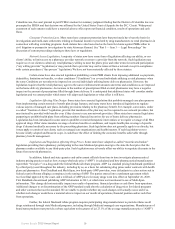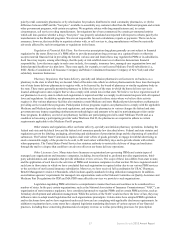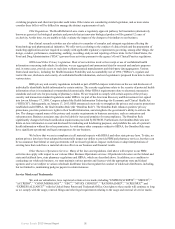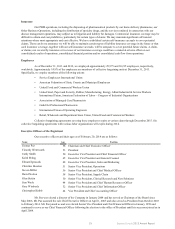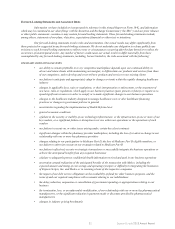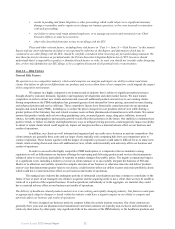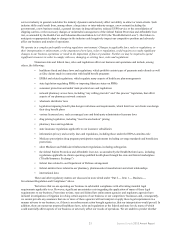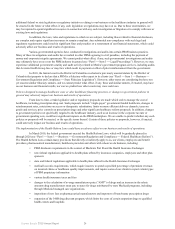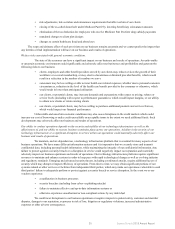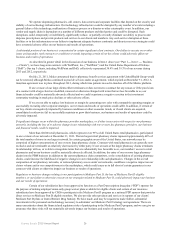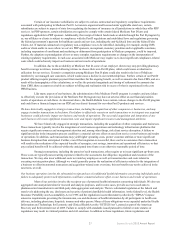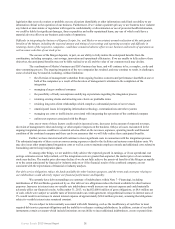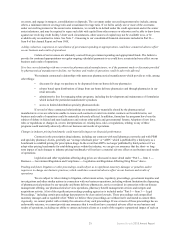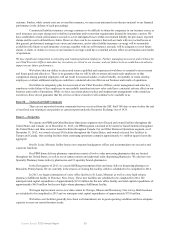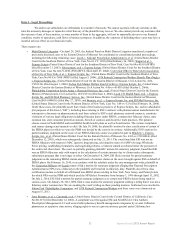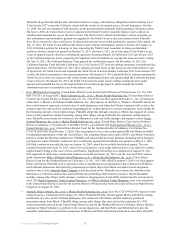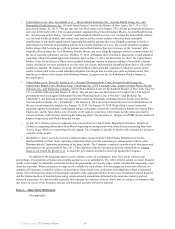Express Scripts 2013 Annual Report Download - page 24
Download and view the complete annual report
Please find page 24 of the 2013 Express Scripts annual report below. You can navigate through the pages in the report by either clicking on the pages listed below, or by using the keyword search tool below to find specific information within the annual report.
Express Scripts 2013 Annual Report 24
additional federal or state legislation or regulatory initiatives relating to our business or the healthcare industry in general will
be enacted in the future or what effect, if any, such legislation or regulations may have on us. Due to these uncertainties, we
may be required to spend significant resources in connection with any such investigation or litigation or to comply with new or
existing laws and regulations.
In addition, the laws, rules and regulations to which we are subject, including those related to financial disclosure,
are complex and require significant resources to remain compliant. Any substantial non-compliance with such legal and
regulatory requirements could result in significant fines and penalties or a restatement of our financial statements, which could
adversely affect our business and results of operations.
Various governmental agencies have conducted investigations and audits into certain PBM business practices.
Many of these investigations and audits have resulted in other PBMs agreeing to civil penalties, including the payment of
money and corporate integrity agreements. We cannot predict what effect, if any, such governmental investigations and audits
may ultimately have on us or on the PBM industry in general (see “Part I — Item 3 — Legal Proceedings”). However, we may
experience additional government scrutiny and audit activity related to Medco’s government program services, including audits
that Accredo Health Group face or may face which result in payment or offset of prior reimbursement from the government.
In 2010, the federal court in the District of Columbia overturned a previously enacted statute by the District of
Columbia that purports to declare that a PBM is a fiduciary with respect to its clients (see “Part I — Item 1 — Business —
Government Regulation and Compliance — State Fiduciary Legislation”). However, other states are considering but have not
yet enacted similar fiduciary statutes, and we cannot predict what effect, if any, these and similar statutes, if enacted, may have
on our business and financial results, nor can we predict how other courts may view such laws.
Policies designed to manage healthcare costs or alter healthcare financing practices or changes to government policies in
general may adversely impact our business and results of operations.
From time to time, certain legislative and/or regulatory proposals are made which seek to manage the cost of
healthcare, including prescription drug cost. Such proposals include “single-payer” government funded healthcare, changes in
reimbursement rates, restrictions on access or therapeutic substitution, limits on more efficient delivery channels, taxes on
goods and services, price controls on prescription drugs and other significant healthcare reform proposals. In addition, changes
to government policies not specifically targeted to the healthcare industry, such as an increase in the corporate tax rate or
government spending cuts, could have significant impacts on the PBM marketplace. We are unable to predict whether any such
policies or proposals will be enacted, or the specific terms thereof. Certain of these policies or proposals, however, if enacted,
could adversely impact our business and results of operations.
The implementation of the Health Reform Laws could have an adverse effect on our business and results of operations.
In March 2010, the federal government enacted the Health Reform Laws, which will be gradually phased in
through 2020 (see “Part I — Item 1 — Business — Government Regulation and Compliance — Federal Healthcare Reform”).
The Health Reform Laws contain many provisions that directly or indirectly apply to us, our clients, employers and benefit
providers, pharmaceutical manufacturers, healthcare providers and others with whom we do business, including:
• PBM disclosure requirements in the context of Medicare Part D and the Health Insurance Exchanges
• new federal regulations applicable to health plans offered by insurance companies, employers and other plan
sponsors
• state and federal regulations applicable to health plans offered in the Health Insurance Exchanges
• medical loss ratio requirements, which require insurers to spend a specified percentage of premium revenues
on incurred claims or healthcare quality improvements, and require some of our clients to report certain types
of PBM proprietary information
• various health insurance taxes and fees
• changes to the calculation of average manufacturer price (“AMP”) of drugs and an increase in the rebate
amounts drug manufacturers must pay to states for drugs reimbursed by state Medicaid programs, including
through Medicaid managed care organizations
• imposition of new fees on pharmaceutical manufacturers and importers of brand-name prescription drugs
• expansion of the 340B drug discount program, which limits the costs of certain outpatient drugs to qualified
health centers and hospitals




